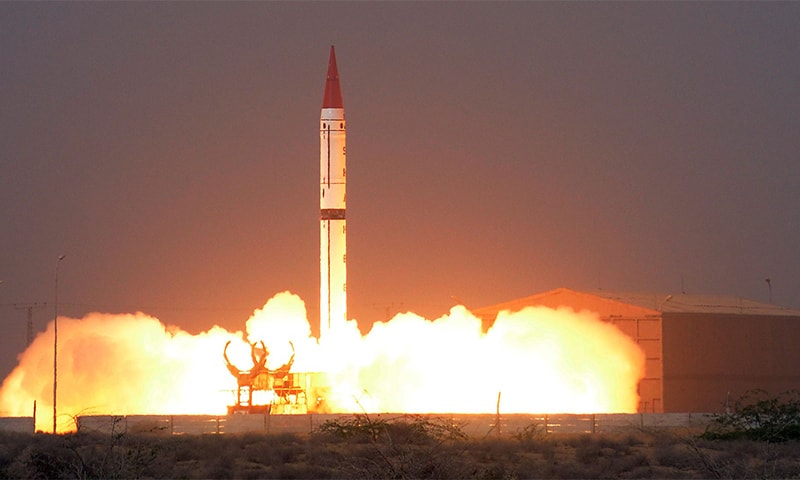Putting all rumors to rest, Pakistan has clarified it is not supplying the Shaheen-III ballistic missiles to Iran as the latter gears to launch an air strike on Israel.
Israeli publication The Jerusalem Post reported on August 6 that Pakistan was contemplating arming Iran with Shaheen-III medium-range ballistic missiles if the war between Iran and Israel intensifies.
Citing sources, the report claimed that Iran reviewed its response to the assassination of Hamas leader Ismail Haniyeh during an urgent meeting of the Organization of Islamic Cooperation (OIC) foreign ministers that was called by Pakistan and Iran in Saudi Arabia earlier this month.
Israeli media report claimed that the transfer of missiles was allegedly discussed during the meeting. Shaheen-III is a two-stage medium-range ballistic missile that runs on solid fuel.
The missile is reportedly capable of carrying both nuclear and conventional payloads and has a range of more than 2,700 kilometers, which essentially means that a potential transfer of this missile to Iran would have significantly bolstered Iranian firepower.
However, on August 9, the spokesperson of Pakistan’s Foreign Office, Mumtaz Zahra Baloch, categorically denied that Islamabad was sending the missile to Iran.
These claims come against the backdrop of an imminent Iranian aerial strike on Israel in retaliation to the assassination of Hamas’ top political leader, Ismail Haniyeh, on Tehran’s soil. Several reports have indicated that Iran was securing support from its partners globally before launching a massive attack.

However, this has also led to a host of speculative reports and rumors on social media. For instance, on August 6, The New York Times reported that Russia was delivering radars and air defense equipment to Iran ahead of a potential conflict with Israel.
Even though the report did not mention the name of the air defense system that was allegedly being delivered, it set off speculation that Iran was due to receive the cutting-edge S-400 Triumf air defense system from Moscow.
Despite plenty of Accounts claiming today that S-400 Surface-to-Air Missile Batteries have been Delivered by Russia to Iran, there is No Evidence yet of this having occurred; with most of these Accounts having Quoted a New York Times Article earlier this week where Iranian… pic.twitter.com/OGB6vLGy7M
— OSINTdefender (@sentdefender) August 8, 2024
So far, neither side has confirmed an S-400 delivery to Iran. While the Kremlin has not commented on these reports, the Pakistani government acted to clear the air after news of the Shaheen-III missile transfer broke out.
Denying the claims about the missile transfer, the Foreign Office said Ishaq Dar, the Deputy Prime Minister and Foreign Minister of Pakistan, attended an emergency meeting called by the Organization of Islamic Cooperation (OIC) in Saudi Arabia this week, where he denounced Israel’s actions in the Gaza strip and called for a ceasefire and improved access for humanitarian aid.
In April this year, Iran and Pakistan demanded in a joint statement that the UN Security Council intervene against Israel, claiming that it had “illegally” attacked neighboring nations and international diplomatic installations. The statement was reportedly released following former Iranian President Ebrahim Raisi’s three-day visit to Pakistan during heightened tension in the Middle East.
On its part, Pakistan does not have diplomatic ties with Israel and has fiercely condemned the killing of Haniyeh. In fact, the country directly blamed Israel for the killing, with the Foreign Office saying: “Pakistan condemns terrorism in all its forms and manifestations including extrajudicial and extraterritorial killings irrespective of the motives.”
Pakistan has also resolutely condemned Israel’s bombing campaign against Gaza and indicated that it stands firmly by Palestine.
US Media Acknowledges S-400’s Might! Says Russian AD System Can Track Stealth Fighters Like F-35
Pakistan Wants De-escalation
Despite its opposition to Israel’s “adventurism” in the Middle East, there has been no indication of military support from Islamabad to Tehran. On the contrary, Pakistan called for “utmost restraint” when Iran launched an air strike on Israel in April 2024 to avenge the bombing of its embassy in Syria.
Following Iran’s retaliatory attacks against Israel, Pakistan’s foreign office expressed grave concern over the escalation of hostilities in the Middle East and urged all parties to exhibit “utmost restraint” and work toward de-escalation of tensions.
In stark contrast to offering military assistance to Iran for its offensive, the South Asian nation has declared its commitment to supporting all initiatives aimed at preventing escalation in the region.
As concerns of a wider battle involving Israel and Iran mount, Pakistan’s foreign ministry stated in a briefing on August 9 that it would support any attempts to stop the war in the Middle East from escalating.
This assertion comes as the US State Department has been engaged in round-the-clock diplomacy, pushing other states to inform Iran that escalation in the Middle East would not be in their best interests. However, the Pakistani Foreign Office spokesperson did not comment on whether her country was in contact with Washington.
- Contact the author at sakshi.tiwari9555 (at) gmail.com
- Follow EurAsian Times on Google News